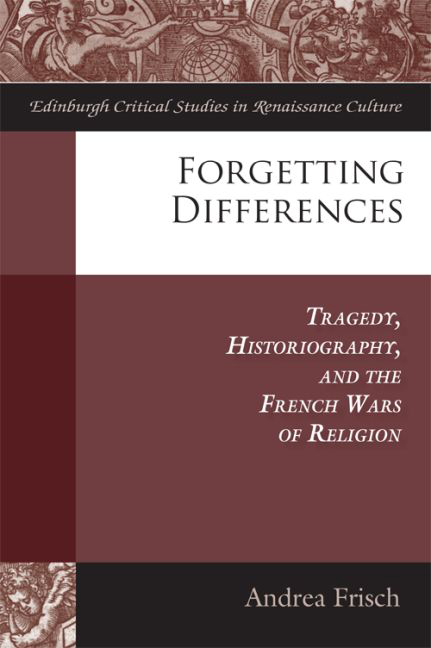5 - From Emotion to Affect
Published online by Cambridge University Press: 12 September 2017
Summary
Toute la France estoit Françoise, tous les François ne faisoyent plus qu'un corps vuidé de ses mauvais humeurs et rempli des esprits de concorde et d'obéissance …
In light of works like the Guisiade or the Mort de Coligny, as well as Robert Garnier's relentlessly grim depictions of tragic distress, we might be moved to ask Pierre Bayle's question, this time of tragedy: how could tragic theater, with its moving representations of explosive political intrigues and interfamilial violence, possibly have functioned as an instrument of reconciliation in the wake of the Wars of Religion?
In his comprehensive History of French Dramatic Literature in the Seventeenth Century, Henry C. Lancaster remarks that “Civil war doubtless retarded the growth of the French stage.” Yet he concludes his discussion of the period of the wars with the observation that there was in fact “considerable dramatic activity, both in the composition and in the performance of plays” during this time (32). Lancaster resolves this apparent contradiction by proclaiming that among these plays, he could find “no work of permanent importance,” but only “personal and political plays” (32). The latter he simply puts in a category apart from that of tragedy, even when their authors explicitly classified them as such. As a consequence, Lancaster argues too hastily that “the influence of such productions will be exerted on writings like the mazarinades rather than on the drama of later years” (156), for influence should not be thought of merely in terms of resemblance or imitation. Just as the civil wars of antiquity were to serve as negative examples for the sixteenth- century French, sixteenth-century tragedy proposed a proximity between spectator and stage that neoclassical dramatists, writing under the régime of oubliance, would seek to avoid. The context of the civil wars, so evident in the earlier plays, therefore also played a role in the transition from humanist to neoclassical tragedy.
- Type
- Chapter
- Information
- Forgetting DifferencesTragedy, Historiography, and the French Wars of Religion, pp. 141 - 171Publisher: Edinburgh University PressPrint publication year: 2015



